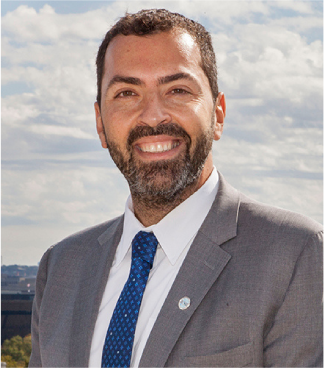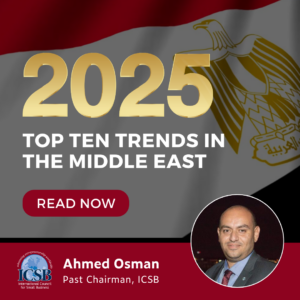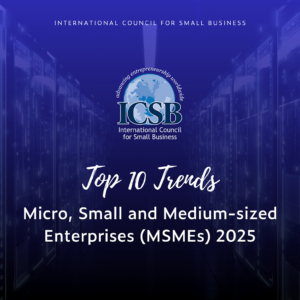
The Top 10 Micro, Small, and Medium Enterprises Trends for 2026
Elevate Your Entrepreneurial Journey ICSB Leadership By Dr. Ayman El Tarabishy President & CEO of the International Council for Small Business.
By Dr. Ayman El Tarabishy
President & CEO of the International Council for Small Business;
Deputy Chair of the George Washington University School of Business, Department of Management

2020 and a dawn of a new decade welcome MSMEs with many exciting opportunities for growth and prosperity, yet it comes with hazards and challenges. Recognized globally for their contributions to innovation and improving economic conditions, MSMEs are the number one job creators across the world.
Last year, ICSB reported that one of the biggest challenges inhibiting the growth of MSMEs was not technology or macro-level issues but with the entrepreneur or small business owner and the power of belief or the lack thereof. Other trends on the 2019’s covered common prevailing topics like the impact that the world’s 1.8 billion youth have on the economy. The population of young people (ages 10 to 24) in the world is at an all-time high.
The other major issue projected in 2019 was that global trade wars will have a major impact on MSMEs. The gloves have come off between the two largest economies in the world, and the imposition of tariffs by each country has plunged the world economy into turmoil.
For 2020, we see major trends continuing yet with three new remarkable changes to the landscape for MSMEs. It is astonishing what a difference a year makes! Here are ICSB’s 2020 Top Ten Trends for MSMEs:
Please scroll down to read the Top Ten Trends! (download the pdf)
10
INSIGHT:
The number one trend of 2019 is now No. 10 for 2020. The POWER OF BELIEF that entrepreneurs, micro-, small and medium enterprises continues to be of vital importance in the world economy. 2020 is no difference.
The belief that a person can create something of economic and social value must be real. And for many, it is becoming a reality. Entrepreneurship is no longer simply the domain of the rich, well-connected, or gender-specific. In particular, women, youth, families, and the disabled are transforming their societies and communities through the POWER OF BELIEF, a belief that they can energize their economies and improve their economic situation.
ICSB RECOMMENDATION:
Continue to strongly encourage the creation and sustainability of MSMEs, not just by starting businesses, but by creating and maintaining adaptable and vibrant economic ecosystems within various types of communities. To have a meaningful impact, all of us must engage our POWER OF BELIEF in individual potential and the creation and sustainability of MSMEs.
09
INSIGHT:
MSMEs make up the very economic fabric of communities, reaching many sustainable development goals without even realizing it. Yet, they can be empowered to do more. MSMEs can become the measuring stick for how well we are progressing towards achieving the SDGs. MSMEs are like the extended family you find in villages, cities, and countries. In good times they celebrate; in tough times, they become resilient.
ICSB RECOMMENDATION:
MSMEs should be educated regarding the SDGs and encouraged to make them a prominent selling point for why consumers should buy from them. Educators, policy-makers, and consultants should do their part to inform, encourage, and assist MSMEs in developing the framework for this new operating model.
Consumers need to be informed about SDGs as well, being made to realize the importance of the relationship of these and MSMEs to the economic vitality of themselves and their communities. Through initiatives like buying organic or recycling, MSMEs should allow consumers to contribute to a sustainable world.
08
INSIGHT:
MSMEs and entrepreneurs will have more options than ever available to finance their companies. Many banks, realizing the importance of supporting such enterprises, have decided to launch new financial products aimed at assisting micro, small, and medium-sized enterprises. Blockchain and cryptocurrencies are also slowly evolving into viable new options. Additionally, new mediums such as peer-to-peer lending, crowd-funding, invoice-factoring, and corporate finance are expected to increase rapidly. These are great opportunities, but they come with hazards.
ICSB RECOMMENDATION:
The rise of Fintech, which includes crowdfunding and peer-to-peer funding, allows broader availability and quicker disbursement of financial support to growing companies. Yet many MSMEs may unintentionally fly under the radar of potential investors. This is another area where additional education is necessary. Universities and the Economic Press can contribute much to inform a large audience about why and how to invest in MSMEs using these new financial tools.
07
INSIGHT:
The global marketplace is just a click away. The world of consumers is more accessible than ever. MSMEs should be encouraged not to limit their market base and consider widening their reach towards global customers. Even MSMEs that offer products and services that are not in high demand in their community or region can have success in a global market with a much larger potential for acquiring new customers. The world has moved from analog to digital and MSMEs must keep up and do the same. This is where they will see success and the potential for growth.
ICSB RECOMMENDATION:
A digital mindset is needed for MSMEs, and the global online market should be seen as an opportunity. Yet, MSMEs must be aware that putting their businesses online requires adequate logistics to handle digital commerce and need to know what these are. Simplicity is the key to success in a complex digital marketplace.
06
INSIGHT:
Today’s environment, as quoted by Professor Hooi Den Huan, Nanyang Business School, Singapore as being RUDE (Rapidly changing; Uncertain; Dynamic and Engaging), because of the ever-changing demographic, economic, technological, political/legal, and social-cultural factors.
ICSB furthers this concept by defining the R.U.D.E teacher who will be in very high demand and will have a massive following, similar to superstar athletes, singers, and movie-stars. They will become a global brand like fashion firms and movie houses and will accordingly be compensated in fame and fortune. They will not have an affiliation to any singular school or university but become a ubiquitous presence.
ICBS RECOMMENDATION:
The reinvention of the educator will change them from being the bearer of information to being R.U.D.E. They will rapidly change their knowledge base to grasp new theories and their applications. In uncertain times, they will steer the education ship to a safe port of reflection and learning. They will understand that learning comes from a variety of means and will build a dynamic learning environment with courses that integrate many sources of knowledge and information. Finally, the R.U.D.E teacher will be the master of engagement. They will not teach, entertain, or educate but engage the learners in a journey of reflection, double-loop learning, and personal growth.
05
INSIGHT:
MSMEs hold a special place in people’s hearts because they are as human as we are. Currently, we see a trend in very nonhuman-centric business models that take the form of industrialization, robots, and artificial intelligence. This trend continues to grow and does not look like it is going to end any time soon, but more likely the opposite. Yet, the heart of humankind will always yearn for a human touch.
ICSB RECOMMENDATION:
Technology is a necessary tool to improve business operations, but it is the human element that makes MSMEs unique and long-lasting. Businesses must not forget to inject human-ness into their practice–it is a key ingredient to their success. Humane entrepreneurship is all-encompassing, and no matter where business trends lead, it will never go out of style with employees and customers who seek humane and even warm treatment. It is never a bad course to take.
04
INSIGHT:
ICSB still projects that global trade wars will be a major issue impacting MSMEs and evidence of that is already being seen. The increased imposition of tariffs by major countries has created alarming issues and concerns for world economies. MSMEs, in particular, feel the heavy consequences of these wars. A 2019 Small Business Confidence Survey reported that tariffs had harmed 37% of small businesses in the US alone, increasing their cost of doing business. The majority have had to increase prices due to this, with 47% saying that it has subsequently caused them to lose customers. The situation will only worsen if the trade wars continue.
ICSB RECOMMENDATION:
MSMEs often believe that they can do little to influence or impact such powerful macro-political forces. Yet, there are actions they can take to minimize the disruption to their businesses. The first is to increase communication with their stakeholders, especially employees, customers, and suppliers. The second is to understand and keep abreast of the trade issues to anticipate their impact on key stakeholders. Finally, by becoming educated and understanding their supply chain and the alternative actions they and their business can take.
03
INSIGHT:
The advent of technology in the workplace or society, in general, is not new. The 1st industrial revolution transformed an economy based on agriculture to one that was based on machines and mechanization. The 2nd industrial revolution extended the influence of the 1st industrial revolution by reshaping the workplace with oil-powered internal combustion engines and electrical communication. The use of digital technology in the 3rd industrial revolution provided advanced computation and insights using information and communication technology.
The 4th industrial revolution represents new ways that technology will interact with the human body and how this convergence will take place across biological and physical worlds. What is not known is how the working relationship between employees and their employer will be affected.
The future of what is called “work of employment” is undergoing a paradigm shift. The use of artificial intelligence (AI) has the potential to eliminate a significant portion of the jobs that are currently done by humans. Some have estimated that by 2030, as many as 30% of the jobs currently available in 2018 will be eliminated.
ICBS RECOMMENDATION:
The 4th Industrial Revolution and the future of work will need to be balanced. A one-sized solution is not possible, globally. The advent of technology will allow those with creative ideas, people who are not localized to any race, class, gender, religion, or region, to reshape the way people have engaged in work and employment. The focus of solving some of society’s most intractable challenges and problems have brought entrepreneurs and small business owners (MSMEs) in line with the goals established by the UN’s 2030 agenda for sustainability.
02
INSIGHT:
Today, entrepreneurship and innovation are urban phenomena. The rise of the entrepreneurial city is becoming a global movement aided by better telecommunications, city governments investing in the start-up community, and today’s youth’s eagerness to travel. Washington D.C., Detroit, Michigan, Salerno, Italy, Macao, Alexandria, have plans for transforming their cities into what we call an entrepreneurial city. This is just the tip of the iceberg for what is coming next year. How did this happen?
For decades, venture capital was an almost exclusively American enterprise. As late as the mid-1990s, nearly all global venture capital investments went to U.S. companies. During the second half of the 1990s and throughout the 2000s, however, venture capital slowly began to flow into locations outside the United States. The last five years, in particular, have seen a dramatic rise in startup and venture capital activity in locations in Europe, Asia, and elsewhere.
ICSB RECOMMENDATION:
The current trend is for the most innovative and entrepreneurial talent to see the world as its new home–unconstrained by borders. These no longer have to come to America to launch, fund, and scale their companies. Cities from around the globe are positioning themselves as the destination and home for entrepreneurs. The reason is simple – cities realized that capital would follow the talent, and capital-backed talent produces the innovation that will define the future. Cities need to be more global with a human touch.
01
INSIGHT:
The status quo is no longer enough. To say it falls far short (to the tune of 60 million jobs that need to be created by 2030) is an understatement of fact, and it is failing even strong economies and (in particular) vulnerable ones alike. The wheels of change need to be set in motion immediately. To first do that, everything that was assumed for the past 50 years must be deeply analyzed, reviewed, scrutinized, and questioned to allow for new ideas to blossom.
The new decade is blowing in with a siren sound, trying to shake the status quo and wake the complacent with dramatic thoughts and concerns for the future. Smaller picture issues like disruption or co-working spaces are not enough to focus on, Human Progress and Identity in a very dynamic and exceptionally fast-moving world must also be addressed.
ICSB RECOMMENDATION:
Forward momentum in these areas is being seen to some extent. Sustainability is trending, the Gulf region welcomes the world, the middle-class in Africa is on the rise, and countries are re-examining their social contracts with their citizens. But is it enough?
MSMEs do have power and can to some extent, take control of the destiny of their businesses. They have actions and options available that they can take to minimize the disruption to their businesses.
MSMEs must educate themselves to understand the supply chain, how it works, and how it affects their business in a variety of ways. It is also important for them to know and understand alternative actions that can be taken.
Many heads can be better than one.
Silence will not end the struggle, but letting their collective voices be heard can influence positive action.
Be part of the largest and oldest network of small businesses and entrepreneurs in the world.

Elevate Your Entrepreneurial Journey ICSB Leadership By Dr. Ayman El Tarabishy President & CEO of the International Council for Small Business.

Discover the dynamic shifts shaping MSMEs in the Middle East! From the rise of sustainability and ethical practices to the power

South Korea’s SMEs and startups are at a critical juncture in 2025, facing challenges from bureaucracy and market stagnation while embracing

The Top 10 Micro, Small, and Medium Enterprises Trends for 2025. The future of MSMEs is an ever-evolving tapestry of innovation,